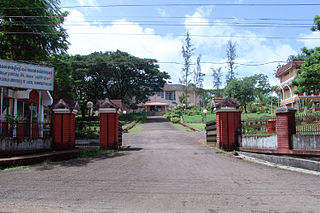Related Research Articles

The Mexican Academy of Sciences(Academia Mexicana de Ciencias) is a non-profit organization comprising over 1800 distinguished Mexican scientists, attached to various institutions in the country, as well as a number of eminent foreign colleagues, including various Nobel Prize winners. The organization, which encompasses exact and natural sciences as well as the social sciences and humanities, is founded on the belief that education, based on the truth of scientific knowledge, is the only means, in the short and long term, of achieving the development of the Mexican spirit and national sovereignty.

The Manohar Parrikar Institute for Defence Studies and Analyses (MP-IDSA), New Delhi, is India's foremost think tank for advanced research in international relations, especially defence, strategic and security issues, and providing training to civilian, military and paramilitary officers of the Indian government. It is funded by the Indian Ministry of Defence but operates as a non-partisan and autonomous body. It aims to promote national and international security by carrying out research on defence and security-related issues and disseminating the knowledge among the policy-makers and wider public.

The Centre for Development Studies (CDS), Thiruvananthapuram, Kerala, India was a civil service training institution. But now it is a higher education institution providing M.A Course in Applied Economics and PhD course in Economics. It is a very reputed institution internationally also. Its main objective is to promote research, teaching and training in disciplines relevant to development.
The Ministry of Statistics and Programme Implementation (MoSPI) is a ministry of Government of India concerned with coverage and quality aspects of statistics released. The surveys conducted by the Ministry are based on scientific sampling methods.

Kerala Institute of Local Administration, abbreviated as KILA, is an autonomous training, research and consultancy organisation constituted under the Ministry of Local Self Government, Government of Kerala, registered as per Travancore – Cochin Literacy, Scientific and Charitable Societies Act-1955. KILA was established in 1990, in the pattern of a national institute, with the main objective of strengthening decentralization and local governance.
An urban planner is a professional who practices in the field of urban planning.
The Central Public Works Department of India, commonly referred to as the CPWD, is a premier Central Government authority in charge of public sector works. The Central Public Works Department, under the Ministry of Urban Development now MoHUA, deals with buildings, roads, bridges, flyovers, complicated structures like stadiums, auditoriums, laboratories, bunkers, border fencing, border roads, etc. CPWD came into existence in July 1854 when Lord Dalhousie established a central agency for execution of public works and set up Ajmer Provincial Division. It has now grown into a comprehensive construction management department, which provides services from project conception to completion, and maintenance management.
Pandit Deendayal Upadhyaya National Institute for Persons with Physical Disabilities (Divyangjan) (P.D.U.N.I.P.P.D.) is an autonomous organisation under the administrative and financial control of Ministry of Social Justice and Empowerment, government of India.
Kerala State Council for Science, Technology and Environment (KSCSTE) is an autonomous body constituted by the Government of Kerala in November 2002 to encourage and promote science and technology-related activities in Kerala State. Prior to the establishment of KSCSTE, the body responsible for carrying out similar work was the State Committee for Science, Technology and Environment (STEC) established in 1972. KSCSTE was formed by restructuring STEC in concurrence with the Science Policy of Government of India.
The National Institute of Rural Development and Panchayati Raj (NIRD&PR), an autonomous organisation under the Union Ministry of Rural Development, is a premier national centre of excellence in rural development and Panchayati Raj. Recognized internationally as one of the UN-ESCAP Centres of Excellence, it builds capacities of rural development functionaries, elected representatives of PRIs, bankers, NGOs and other stakeholders through inter-related activities of training, research and consultancy. The Institute is located in Hyderabad, Telangana. The NIRD&PR celebrated its Golden Jubilee Year of establishment in 2008. In addition to the main campus at Hyderabad, this Institute has North-Eastern Regional Centre at Guwahati, Assam to meet the NE-regional needs.
The Ministry of Information & BroadcastingWazarat-e- it-tila-aat o nashriyat is a Cabinet-level ministry of Government of Pakistan, responsible to release government information, media galleries, public domain and government unclassified non-scientific data to the public and international communities. The MoIB has jurisdiction for administrating the rules and regulations and laws relating to information, broadcasting and the press media in Pakistan.
National Institute of Hydrology (NIH) is an autonomous society under Ministry of Water Resources, River Development & Ganga Rejuvenation, Government of India and has been functioning as a research Institute in the area of hydrology and water resources in the country since December 1978 in Roorkee City. Main objectives of the institute are to undertake, support, promote and coordinate systematic and scientific research work in all aspects of Hydrology and Water Resources.
National Agricultural Cooperative Marketing Federation of India (NAFED) was established on Gandhi Jayanti on 2 October 1958. NAFED is registered under the Multi State Co-operative Societies Act. It was setup with the object to promote co-operative marketing of agricultural produce to benefit the farmers. Agricultural farmers are the main members of NAFED, who have the authority in the form of members of the General Body in the working of the body.
National Institute of Disaster Management abbr. NIDM, is a premier institute for training and capacity development programs for managing natural disasters in India, on a national as well as regional basis. The National Centre of Disaster Management (NCDM), constituted under an Act of Parliament in 1995; was re-designated to give the present name of National Institute of Disaster Management (NIDM) by the Disaster Management Act 2005 passed by President of India on 9 January 2006,

The Tamil Nadu State Agricultural Marketing Board (TNSAMB) was constituted by an executive order of the State Government in G.O. Ms. No.2852 Agriculture Department, dated: 24.10.1970 and functioning since 24.10.1970, with the objective to regulate the activities of Market Committees and to act as an advisory body.

The Spanish Agency for International Development Cooperation (AECID) is a Spanish autonomous agency responsible for the management of the Government international development cooperation policy.

The Institute of Economic Growth, is an autonomous body and civil service training institute under the Government of India, founded in 1952 by the renowned economist, V. K. R. V. Rao, for advanced research on economic and social development. It is widely regarded as a centre of excellence in the field. The institute is situated on Malka Gunj road, at University Enclave, University of Delhi, New Delhi, India.

The Rajiv Gandhi National Institute of Youth Development (RGNIYD), Regional Centre, Chandigarh was established in 2014 in city of Chandigarh. The Regional Centre is part of its parent institution Rajiv Gandhi National Institute of Youth Development located at Sriperumbudur, Tamil Nadu, India, which is an Institute of National Importance by an Act of Parliament no. 35/2012 under the Ministry of Youth Affairs & Sports, Government of India and a Deemed University declared under Section 3 of the UGC Act, 1956.
National Institute for the Empowerment of Persons with Visual Disabilities (Divyangjan), Dehradun is a premier organisation under the administrative control of Department of Empowerment of Persons with Disabilities (Divyangjan), Ministry of Social Justice and Empowerment, Government of India. Institute is training centre for the blind, located in an area of about 43 acres on Mussoorie-Dehradun Highway. It is also engaged in production of Braille literature, aids and appliances for the visually handicapped. It also undertakes research and developmental activities ensuring emergence of disability inclusive policies, programmes and practices. The Institute is governed by the Management & Advisory Bodies.
The National Institute for Safety and Health at Work is an autonomous agency of the Government of Spain. The INSST is considered a technical-scientific agency entrusted with the task of analyze and research on safety and health conditions at work, as well of promoting and supporting the improvement of them, in order to achieve a decrease in occupational hazards, work accidents and occupational diseases.